Ccrn stuvia - Study guides, Class notes & Summaries
Looking for the best study guides, study notes and summaries about Ccrn stuvia? On this page you'll find 37 study documents about Ccrn stuvia.
Page 4 out of 37 results
Sort by
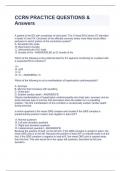
-
CCRN PRACTICE QUESTIONS & Answers
- Exam (elaborations) • 19 pages • 2023
-
- $11.99
- + learn more
A patient in the ED with complaints of chest pain. The 12-lead EKG shows ST elevation in leads V3 and V4. Occlusion of the affected coronary artery most likely would affect perfusion to which portion of the conduction system? A. Sinoatrial (SA) node B. Bachmann's bundle C. Atrioventricular (AV) node D. Bundle of His - ANSWERSLAD so D. bundle of his Which of the following is the preferred lead for ST segment monitoring for a patient with a suspected RCA occlusion? A.I B. aVR C....
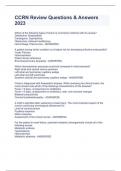
-
CCRN Review Questions & Answers 2023
- Exam (elaborations) • 21 pages • 2023
-
- $10.99
- + learn more
Which of the following types of shock is incorrectly matched with its causes? Distributive: Anaphylactic Cardiogenic: Dysrhythmia Obstructive: Adrenal Insufficiency Hemorrhage: Plasma loss - ANSWERSC A patient having which condition is at higher risk for developing infective endocarditis? Cystic Fibrosis Hydrocephalus Patent ductus arteriosus Bronchopulmonary dysplasia - ANSWERSC Which hemodynamic pressures would be increased in mitral stenosis? Right atrial and central venous pre...
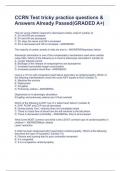
-
CCRN Test tricky practice questions & Answers Already Passed(GRADED A+)
- Exam (elaborations) • 37 pages • 2023
-
Available in package deal
-
- $9.99
- + learn more
How do young children respond to decreased cardiac output? (cardiac 3) A. SV and HR are increased B. SV and HR are decreased C. SV stays the same and HR is increased D. SV is decreased and HR is increased - ANSWERSC The majority of cardiac arrests in kids are due to - ANSWERSRespiratory failure Adrenergic stimulation is one of the compensatory mechanisms used when cardiac output fails. Which of the following is a result of adrenergic stimulation? (cardiac 6) A. Longer diastolic per...
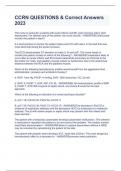
-
CCRN QUESTIONS & Correct Answers 2023
- Exam (elaborations) • 22 pages • 2023
-
- $11.99
- + learn more
The nurse is caring for a patient with acute inferior wall MI, post-coronary artery stent deployment, For optimal care of the patient, the nurse should: - ANSWERSContinuously monitor the patient in lead II It is best practice to monitor the patient status post PCI with stent, in the lead that was most abnormal during the acute occlusion. The ECG demonstrates ST elevation in leads II, III and aVF. The nurse needs to monitor the patient closely for which of the following? - ANSWERSComplicati...
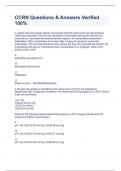
-
CCRN Questions & Answers Verified 100%
- Exam (elaborations) • 32 pages • 2023
-
- $13.49
- + learn more
A patient has had a large anterior myocardial infarction last month and developed a ventricular aneurysm. He now has episodes of ventricular tachycardia that are not prevented or converted with antidysrhythmic agents. An implantable cardioverter-defibrillator (ICD) is implanted. Four days after surgery he develops ventricular tachycardia. The ICD has delivered three shocks but has not converted the rhythm. He is pulseless and apneic. Cardiopulmonary resuscitation is in progress. What is the prio...
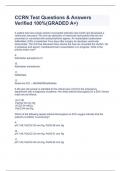
-
CCRN Test Questions & Answers Verified 100%(GRADED A+)
- Exam (elaborations) • 32 pages • 2023
-
Available in package deal
-
- $9.99
- + learn more
A patient has had a large anterior myocardial infarction last month and developed a ventricular aneurysm. He now has episodes of ventricular tachycardia that are not prevented or converted with antidysrhythmic agents. An implantable cardioverter-defibrillator (ICD) is implanted. Four days after surgery he develops ventricular tachycardia. The ICD has delivered three shocks but has not converted the rhythm. He is pulseless and apneic. Cardiopulmonary resuscitation is in progress. What is the prio...
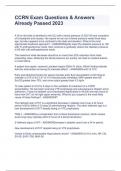
-
CCRN Exam Questions & Answers Already Passed 2023
- Exam (elaborations) • 16 pages • 2023
-
- $10.99
- + learn more
A 56 yr-old male is admitted to the ICU with a blood pressure of 225/135 and complains of a headache and nausea. He reports he ran out of blood pressure meds three days ago, but also appears to be confused to the date and situation. What is the most appropriate treatment approach? - ANSWERRapidly lower the diastolic pressure to 100 with IV antihypertensive meds, then continue to gradually reduce the diastolic pressure to 85 with oral antihypertensive meds. The maximum initial decrease should...

How did he do that? By selling his study resources on Stuvia. Try it yourself! Discover all about earning on Stuvia


